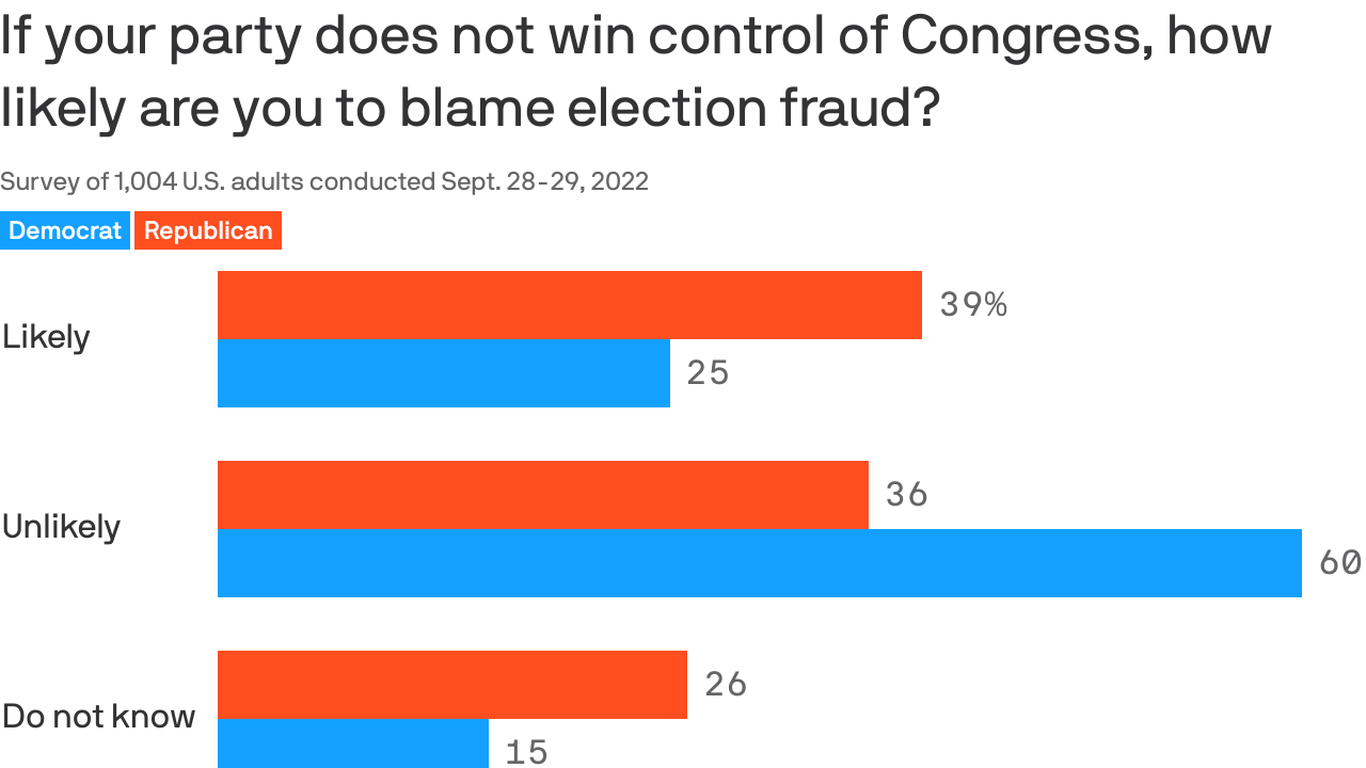Nearly four out of 10 Republicans and one in four Democrats say they’ll blame election fraud if their party doesn’t win control of Congress in November, in the latest wave of the Axios-Ipsos Two Americas Index.
Why it matters: A month out from the 2022 midterms, 2020’s Big Lie is alive and morphing into a broader distrust of institutions and elections that threatens to become entrenched.
By the numbers: Republicans surveyed are significantly more likely than Democrats not only to predict that election fraud will play some role if their party loses, but to feel that suspicion intensely.
- One in five Republicans said it would be “highly likely” for election fraud to explain why their party wouldn’t take over control of Congress, compared to one in 10 Democrats who said they’d feel that way if they lose.
- In addition, Democrats were more likely than Republicans to dismiss the likelihood of fraud completely.
- 60% of Democrats said fraud is unlikely to be the reason if their side loses (15% said they don’t know), while 36% of Republicans said fraud is unlikely to be the reason if they lose (26% said they don’t know).
The intrigue: The survey found that Americans who’d shared at least one meal in the past month with others from different political affiliations would be more skeptical about jumping to conclusions that election fraud caused a loss.
What they’re saying: “When you have connections across the aisle with other people, you’re less likely to give into or even entertain some of the ‘crazy,'” said Ipsos pollster and senior vice president Chris Jackson.
- “There are so few of those connections remaining, and that lack of connection contributes the space for people to believe the Big Lie and that elections are going to be stolen and all those kinds of things. Because they’re believing it about someone they’ve never met,” Jackson said.
The big picture: Respondents were split on the generic ballot question, with 35% saying they intend to vote for Democratic candidates and 31% saying they plan to vote for Republican candidates. Across the aisle, motivations were more positive than negative.
- 69% of those planning to vote for Democrats said they’re driven by support of Democratic candidates and their policies, with 27% motivated by opposition to Republicans and their policies.
- 65% backing Republicans affirmatively support GOP people and ideas while 30% are driven by opposition to Democrats and their policies.
- One-third overall say when they think about the congressional election they feel hope — about twice the share who say they feel dread.
- 43% of respondents said former President Trump is unfairly targeted by the left, while 45% disagreed. The results were split predictably along party lines.
Methodology: This Axios/Ipsos Poll was conducted Sept. 28-29 by Ipsos on their online survey panels in English. This poll is based on a sample of 1,004 general population adults age 18 or older, weighted on age, gender, race/ethnicity, education, and location to be nationally representative.
- The margin of sampling error is ±3.8 percentage points at the 95% confidence level, for results based on the entire sample of adults.
